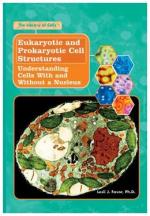|
This section contains 263 words (approx. 1 page at 300 words per page) |
Prokaryotes are cells or organisms that lack a nuclear membrane and membrane bound organelles. Prokaryotic cells are characteristic of a metabolically diverse assortment of bacterial organisms grouped together in the kingdom Monera. Two major groups of bacteria, the Eubacteria and Archaebacteria, have been identified and because they differ in important ways, they are sometimes divided into separate phylogenetic kingdoms. Prokaryotic cells differ from eukaryotic cells in important ways. Prokaryotic cells are usually much smaller than eukaryotic cells, and are able to grow and divide rapidly. Eukaryotes, with a true membrane-bound nucleus and discrete membrane-bound organelles, are able to compartmentalize functional activity into structural components such as mitochondria, chloroplasts, lysosomes, endoplasmic reticulum, and Golgi complex. Prokaryote cells may carry out all of the activities assigned to organelles without the benefit of these specialized structures. Prokaryotes and eukaryotes differ to some extent in their biochemical composition, particularly with respect to their lipid composition. They also differ in many aspects of their metabolism. Some of the most significant of these differences involve the nature of genes and the manner in which genetic information is expressed. The genes of prokaryotes are simpler and do not contain the large amounts of material incidental to protein synthesis found in eukaryotes. Prokaryotes have been present on Earth for much of its history, and in one form or another have occupied nearly all potential habitats. Although some prokaryotes cause disease in plants and animals, the overwhelming majority do not. Many are necessary for timely recycling of dead organic matter that without them would tend to accumulate in the environment.
|
This section contains 263 words (approx. 1 page at 300 words per page) |


